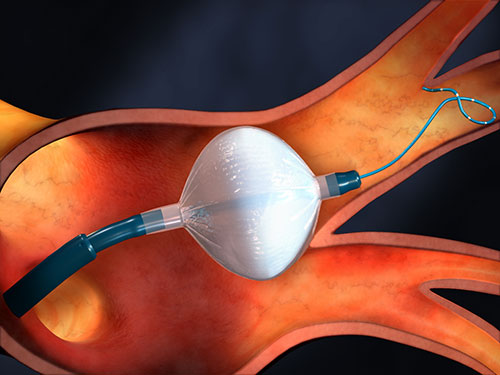
Popular Locations
- Outpatient Surgery - Bridgeport Hospital
- Park Avenue Medical Center
- Primary Care Center - Bridgeport Hospital


Tuesday, August 16, 2016
On Aug. 9, the Joel E. Smilow Heart Institute at Bridgeport Hospital performed Yale New Haven Health's first cardiac cryoablation to treat atrial fibrillation (a-fib), the most common type of heart rhythm disorder.
The patient is an active woman in her 60s with significant a-fib symptoms. She was discharged the following morning.
Cardiac electrophysiologist Murali Chiravuri, MD, led the team that conducted the procedure, using the minimally invasive Medtronic Arctic Front Advance system. This innovative system uses coolant (liquid nitrogen), rather than heat as in traditional radiofrequency ablation (RFA) procedures, to isolate the pulmonary veins where electrical signals originate and stop the erratic signals that cause a-fib.
Arctic Front is an entirely closed system so no liquid nitrogen makes any contact with the heart. Only the balloon tip of a catheter comes in contact with tissue.
Cryoablation has been shown to be more effective in patients for whom drug therapy has failed. In addition, the procedure time is drastically shorter compared to RFA. This allows more patients to tolerate anesthesia.
"By treating patients with the most advanced technology, we are better able to manage their atrial fibrillation to improve their overall quality of life and significantly reduce a-fib symptoms, including palpitations, fatigue, rapid heartbeat, swelling and fainting," said Dr. Chiravuri.
"Not only is a-fib the most common heart rhythm disorder, it is also often undertreated because many patients and providers are unaware of therapeutic options such as cryoablation," Dr. Chiravuri added. "A-fib patients have up to five times higher risk of stroke and an increased chance of developing heart failure."
9/3/2025
Bridgeport Hospital names new section chief for CardiologyBRIDGEPORT, CT (September 3, 2025) – Bridgeport Hospital has a new section chief of Cardiology – Samuel Hahn, MD. Dr. Hahn has been an integral part of Yale New Haven Health for many years.
11/19/2024
Bridgeport Hospital certified by Joint Commission as Thrombectomy Capable Stroke CenterBridgeport, CT (November 19, 2024) – Bridgeport Hospital has been certified by the Joint Commission as a Thrombectomy-Capable Stroke Center (TSC).